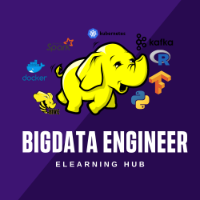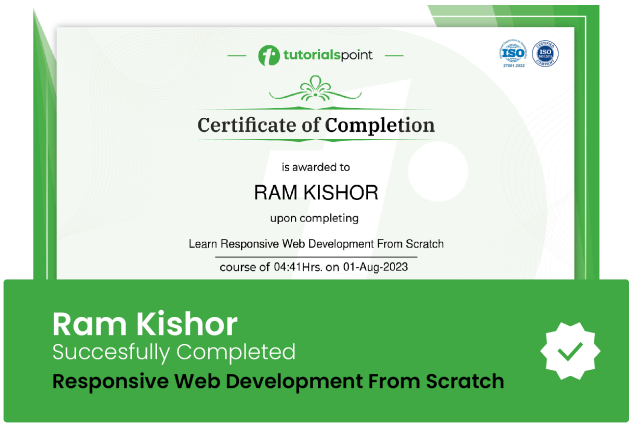Course on Jupyter Notebook - Big Data Visualization Tool
Jupyter Notebook - Big Data Visualization Tool for Data Scientist & Big data Engineers An Open Source Tool (Free Source)
Lectures -28
Duration -55 mins

30-days Money-Back Guarantee
Get your team access to 10000+ top Tutorials Point courses anytime, anywhere.
Course Description
Jupyter Notebook - Big Data Visualization Tool for Big data Engineers and Data Scientist for an Open Source Tool (Free Source for Data Visualization)
Learn the latest Big Data Technology Tool- Jupyter Notebook! And learn to use it with one of the most popular programming languages, Scala, Python, Julia, R, Ruby, and many more!
One of the most valuable technology skills is the ability to analyze huge data sets, and this course is specifically designed to bring you up to speed on one of the best technologies for this task, Jupyter Notebook! The top technology companies like Google, Facebook, Netflix, Airbnb, Amazon, NASA, and more are all using Spark to solve their big data problems!
Jupyter Notebook is an open-source web application that allows you to create and share documents that contain live code, equations, visualizations and narrative text. Uses include: data cleaning and transformation, numerical simulation, statistical modeling, data visualization, machine learning, and much more.
JupyterLab is a web-based interactive development environment for Jupyter notebooks, code, and data. JupyterLab is flexible: configure and arrange the user interface to support a wide range of workflows in data science, scientific computing, and machine learning. JupyterLab is extensible and modular: write plugins that add new components and integrate with existing ones.
Master Bigdata Visualization with Jupyter Notebook.
Jupyter Notebook provides a web-based notebook you can use support following languages:
Python
Julia
R
Ruby
Haskell
Scala
node.js
Go
We will Learn:
Data Ingestion in Jupyter environment
How to Use Jupyter to process Data in Python, Scala, Julia, R and Swift
Data Discovery
Data Analytics in Jupyter
Data Visualization
JupyterLab
Jupyter Notebook
How to use JupyterLab
How to use Jupyter Notebook
Goals
What will you learn in this course:
- You will be able to learn Data Ingestion in Jupyter environment an essential requirement for Data Science and Big Data Engineering.
- How to Use Jupyter to Processs Data in Python, Scala, Julia, R and Swift
- You will be able to learn about Data Discovery
- Data Analytics in Jupyter
- Data Visualization
- JupyterLab
- Jupyter Notebook
- How to use JupyterLab
- How to use Jupyter Notebook
Prerequisites
What are the prerequisites for this course?
- Basic knowledge of Data Analytics is appreciated but if you don't have any knowledge on Data Analytics its fine.
- Latest Google Chrome Browser

Curriculum
Check out the detailed breakdown of what’s inside the course
Introduction
23 Lectures
-
Introduction 03:20 03:20
-
Installation Steps for Jupyter Lab on Linux machines
-
Installation Steps for Jupyter Notebook on Linux Machines
-
Introduction to Project Jupyter 02:48 02:48
-
Jupyter Architecture 02:43 02:43
-
WHAT IS JUPYTER NOTEBOOK? 03:41 03:41
-
Few Example of Jupyter Notebook 03:27 03:27
-
WHAT IS JUPYTERLAB? 03:23 03:23
-
Free Account creation in IBM Skills Network Labs 01:51 01:51
-
Launch Jupyter Lab in IBM Skills Network Labs 02:01 02:01
-
Loading Data into IBM Skills Developer Lab 01:52 01:52
-
Creating a Jupyter Notebook 06:42 06:42
-
Renaming a Notebook 02:14 02:14
-
Saving a Notebook 02:03 02:03
-
Example of Python, Scala, R, Julia and Swift Code 04:36 04:36
-
User interface components of Notebook 02:38 02:38
-
Kernels 02:00 02:00
-
Large Output 01:00 01:00
-
Example of Mathematics Equation in MarkDown Language 01:13 01:13
-
Alternate Free Access to JupyterLab 02:09 02:09
-
Supported browsers 01:32 01:32
-
Output Formats 01:49 01:49
-
Exporting Notebooks 02:02 02:02
Frequently Asked Questions
4 Lectures

Instructor Details

Bigdata Engineer
eCourse Certificate
Use your certificate to make a career change or to advance in your current career.

Our students work
with the Best


































Related Video Courses
View MoreAnnual Membership
Become a valued member of Tutorials Point and enjoy unlimited access to our vast library of top-rated Video Courses
Subscribe now
Online Certifications
Master prominent technologies at full length and become a valued certified professional.
Explore Now


 Updated on Apr, 2024
Updated on Apr, 2024
 Language - English
Language - English
